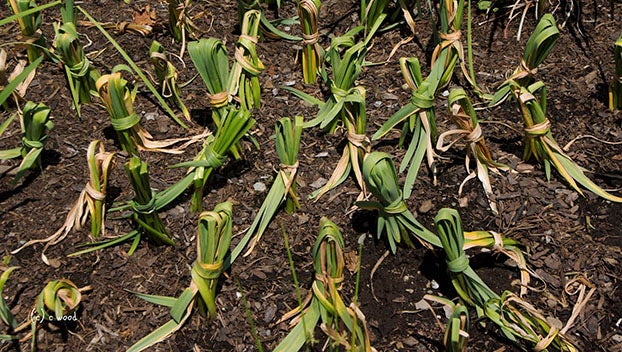Through the Garden Gate: Butchery in the garden
Published 12:20 pm Sunday, March 5, 2023
|
Getting your Trinity Audio player ready...
|
Gardens seem so peaceful. We talk about them as refuges, great places to relax, read, meditate, and just escape from the hassle of everyday life. Underneath that tranquility, however, there lurks a strong current of violence, butchery even. Much of it caused by us gardeners.
Keeping a garden looking its best requires regular hard-hearted decisions and butchery. We gardeners often find a plant that we like and buy it without considering where we will plant it and whether it’s a good fit for the space that we have. The result is that within a year or so that interesting plant has outgrown its allotted space, sprawled all over other plants, or worse yet, is sulking because it’s been planted where there isn’t enough sun or too much sun. Or too much moisture or the wrong type of soil. We are then forced to cut the once darling plant back to a more manageable size – butcher it – or remove it because it’s never going to thrive where we’ve planted it. Sometimes we fall in love with a plant at the local nursery, haul it home to our garden and then, several years later, discover that we just don’t like it. In fact, we can’t imagine why we ever bought it. Perhaps it didn’t live up to expectations or our taste has changed. No matter. The offending plant has to go. What to do? Get rid of the offending plant, but next time spend more time researching the growth habits and requirements of plants before buying them.
Another kind of butchery results from gardeners’ attempts to make plants bend to their will. Plants are sheared into fanciful shapes, such as cute animals, even turned into crenellated walls. More commonly evergreens, including boxwood and hollies, are planted as foundation plants, surrounded by a thick layer of mulch, and cut into uniform round spheres. Even azaleas and forsythia, which naturally have open forms, are subjected to this treatment. One landscaper has referred to the resulting look as “meatballs on mulch!” No matter what you call it, it’s unnatural. A better solution is to purchase foundation plants that remain relatively small and have a pleasantly natural shape.
Still other gardeners like to torture their spring bulbs. Once their daffodils have bloomed, they twist the leaves into bundles, fold them in half, and tie them up with rubber bands. Others prefer to braid the leaves. Bondage! The problem with this approach is twofold: when so severely restrained, the leaves cannot conduct optimum photosynthesis, resulting in fewer blooms over the next few years. The bundles also look very odd, not unlike a small army of hattifatteners, those tall, skinny creatures resembling fungi or shapeless socks that inhabit the Moomintroll universe. A better approach is to intermix daffodils among other plants that will hide their foliage as it dies.
Some violence in the garden is unavoidable. Insects chomp on the delicate leaves of spring greens or ruin our favorite flowers. Hordes of hungry deer think our hostas and daylilies are a salad bar set up just for them. And then there are the family dogs! They dig up the most expensive new plants in the garden and bring them to us as gifts or they nap in cozy beds they’ve made in the daylilies that are just about to bloom. These types of violence are hard to avoid. Hand picking can remove insects if there aren’t many, but insecticides are often required. Very disciplined gardeners solve the deer problem by not planting anything that appeals to them or by intermixing plants that deer don’t like. The dog problem? I don’t have good solutions. I have haphazard fences around just about everything. I’m looking forward to the day when my teenage marauders will be calm, sedate adults.
Gardens look peaceful and gardening is suggested as an activity for promoting mental health, but experienced gardeners know that there’s violence in every garden. That’s all right; the violence makes the peacefulness even more special.
Dr. Cynthia Wood is a master gardener. Her email address is cynthia.crewe23930@gmail.com.





